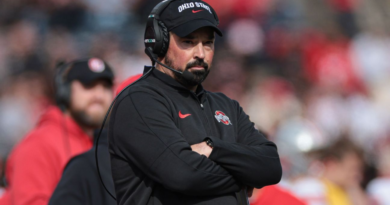Marta's World Cup finale overshadowed by Brazil's poor play
There is no spin to be put on this, no ‘positives to be taken’ from Brazil‘s exit from the Women’s World Cup. The team had a full cycle of preparation, with unprecedented resources, under the command of a top class coach in Pia Sundhage — and will now leave after the group stage for the first time since 1995.
It is an unmitigated disaster. It is also a melancholic end to the World Cup career of the great Marta — almost as melancholic as her performances in this tournament.
– Women’s World Cup bracket and fixtures schedule
But Jamaica were able to smother that danger, as opponents have been able to smother Marta in this competition. Her sixth World Cup may well have been one too many. It has been some time since she has been able to tip the balance on an individual level. Tellingly, 14 of her 17 World Cup goals came in the first three tournaments she played. The final three brought just one goal from open play.
But if she has been overtaken, that is not only the consequence of the inevitable decline of age. It is also the product of the rapid development of the sport — something that she did more than anyone else to bring about. In that sense, she is a victim of her own success — which might give a small crumb of consolation on the long trip back from Australia.
Brazil met Jamaica in their opening game of the previous World Cup. Brazil won 3-0, with all the goals coming from veteran striker Cristiane. Sundhage took charge after the tournament. She ditched Cristiane and kept Marta. That might have been a mistake. Sundhage’s entire reign will now come under the microscope — which is appropriate, since the entire process was set up to be judged on results in this tournament.
The sport has developed to the level where there is often a fine margin between winning and losing. Brazil produced an excellent opening win (4-0 over Panama) followed by a narrow defeat to France and then a fatal draw against Jamaica where they had all the play but created very few chances. The Panama game was very much her triumph. The team played as a collective block, squeezing the opposition into their half of the field, working hard to win back possession and keeping the pressure on.
The France match did not go so well. Sundhage was out-thought. She thought that France were slow to recompose their defence, and went with two quick strikers to expose them on the transitions. But it left Brazil too stretched out, and France took advantage of the space. Which brings us to the Jamaica game, where the team’s limitations were exposed, in two key areas.
Firstly, their creative repertoire proved heavily dependent on firing in crosses against weak teams unable to defend in the air. As soon as they came up against more competent and better organised defences then they ran into problems. This is especially worrying since, after a couple of years when defence was the focus, Sundhage had recently been concentrating on widening the attacking repertoire.
And then there is the team’s emotional state. Against Jamaica, as the clock ticked away the team got worse through the course of the game. The first half at least brought the occasional half chance. After the break, when the screw really should have been turned, there was next to nothing. Under scoreboard pressure, the team did not perform.
Was there too much emotional dependence on a Marta who was no longer able to deliver? Or was there an insufficient emotional connection between Sundhage and her players? One issue which has been bubbling under for a while now — and which came to the surface after the defeat to France — was Sundhage’s lack of proficiency in Portuguese. After four years she still does not speak the language in public and is, apparently, hesitant and halting in private. She sometimes seems mystified by her players, complaining during the course of this competition that sometimes they pass too much, and sometimes they do not pass enough.
The mix of Scandinavia and South America was always full of possible opportunities and threats. In some ways it has worked. The players probably think more collectively than before, and are less prone to go to ground looking for cheap fouls. But maybe, when it came down to it there was a lack of an emotional connection when it mattered most.
What happens now? Marta leaves the stage, and it will be interesting to see what she does next. Will Pia stay? She is under contract until the 2024 Olympics in Paris, but nothing is guaranteed.
Brazil’s best player in the Jamaica game was experienced centre back Rafaelle. After the game she was asked if Sundhage should be replaced. “I think we have to think about what’s best for women’s football,” she said. “If there is someone better, with more quality, then the sport deserves it.” It is hardly a ringing endorsement.




